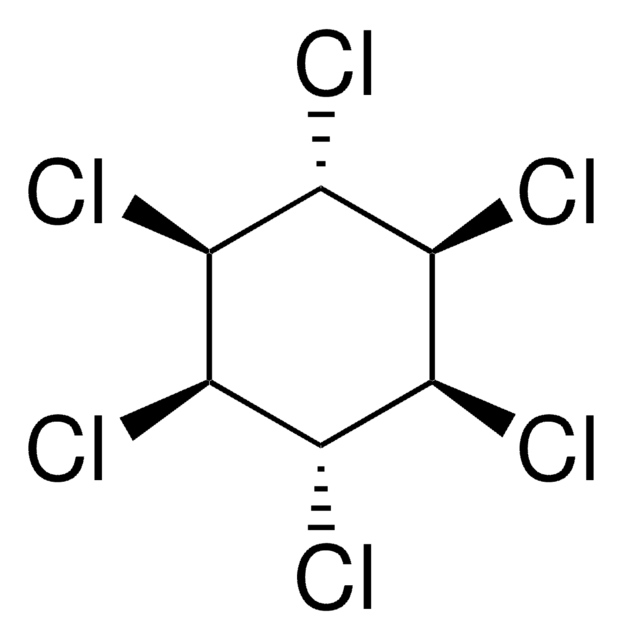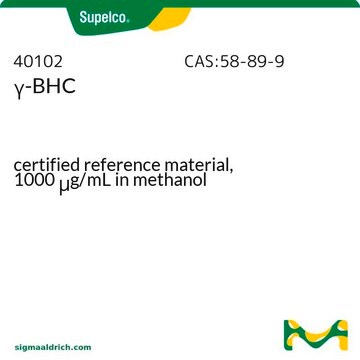Wichtige Dokumente
33377
δ-HCH
PESTANAL®, analytical standard
Synonym(e):
δ-1,2,3,4,5,6-Hexachlorcyclohexan
About This Item
Empfohlene Produkte
Qualität
analytical standard
Qualitätsniveau
Produktlinie
PESTANAL®
Haltbarkeit
limited shelf life, expiry date on the label
Methode(n)
HPLC: suitable
NMR: suitable
gas chromatography (GC): suitable
mp (Schmelzpunkt)
136-140 °C
Eignung
passes test for identity (NMR)
Anwendung(en)
agriculture
environmental
Format
neat
SMILES String
Cl[C@@H]1[C@@H](Cl)[C@H](Cl)[C@@H](Cl)[C@H](Cl)[C@@H]1Cl
InChI
1S/C6H6Cl6/c7-1-2(8)4(10)6(12)5(11)3(1)9/h1-6H/t1-,2-,3-,4+,5-,6-
InChIKey
JLYXXMFPNIAWKQ-GPIVLXJGSA-N
Suchen Sie nach ähnlichen Produkten? Aufrufen Leitfaden zum Produktvergleich
Anwendung
Rechtliche Hinweise
Signalwort
Danger
H-Sätze
Gefahreneinstufungen
Acute Tox. 3 Oral - Acute Tox. 4 Dermal - Aquatic Acute 1 - Aquatic Chronic 1 - Carc. 2
Lagerklassenschlüssel
6.1C - Combustible acute toxic Cat.3 / toxic compounds or compounds which causing chronic effects
WGK
WGK 3
Flammpunkt (°F)
Not applicable
Flammpunkt (°C)
Not applicable
Persönliche Schutzausrüstung
Eyeshields, Faceshields, Gloves, type P3 (EN 143) respirator cartridges
Hier finden Sie alle aktuellen Versionen:
Besitzen Sie dieses Produkt bereits?
In der Dokumentenbibliothek finden Sie die Dokumentation zu den Produkten, die Sie kürzlich erworben haben.
Kunden haben sich ebenfalls angesehen
Unser Team von Wissenschaftlern verfügt über Erfahrung in allen Forschungsbereichen einschließlich Life Science, Materialwissenschaften, chemischer Synthese, Chromatographie, Analytik und vielen mehr..
Setzen Sie sich mit dem technischen Dienst in Verbindung.












